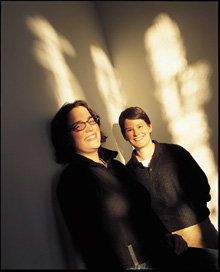 Out
and about
Out
and about
Mentoring
program helps students get comfortable with their sexual identities.
People
at Chicago are pretty accepting of minority sexual identities,"
says Bert Cohler, AB'61, the William Rainey Harper professor
in the Social Sciences Collegiate Division. "At Chicago,
as long as you continue to do well academically, you can be
anything."
 Being
yourself and negotiating the attendant challenges are two different
things. Should a gay student mention sexual orientation on a
résumé or a grad school application? How does
a student tell her parents that this year's guest for Thanksgiving
is not a boyfriend but a girlfriend? Is it possible to be gay
and still have children someday?
Being
yourself and negotiating the attendant challenges are two different
things. Should a gay student mention sexual orientation on a
résumé or a grad school application? How does
a student tell her parents that this year's guest for Thanksgiving
is not a boyfriend but a girlfriend? Is it possible to be gay
and still have children someday?
With
the Lesbian, Gay, Bisexual, Transsexual, or Questioning (LGBTQ)
Mentoring Program, the answers are a phone call or e-mail away.
Modeled on a similar program run by the University's Coordinating
Council for Minority Issues, the program matches queer students
with a queer faculty or staff member. Mentors and mentees talk
at least once a week and meet in person at least once a quarter.
The program also sponsors field trips, such as dinners, Cubs
games, and Court Theatre performances.
The
program was started in January 2001 by College adviser Kathy
Forde, along with Jim Howley, graduate career counselor at Career
and Placement Services, and fourth-year Anne Pizzi, then-president
of the student organization Queers & Associates. Forde-who
is also Pizzi's mentor-now runs the mentoring program with College
adviser John Laseman. A year later the program has grown from
20 faculty and staff mentors and 24 student mentees to 32 mentors
and 39 mentees.
Many
mentors say the program is a chance to make a younger person's
college experience easier than theirs was. Cohler, mentor to
second-year Carlos Ocampo, remembers a U of C that was "totally
closeted. At many universities, one could have been expelled
on the basis of one's sexual orientation. It wouldn't have been
the case here, but one would certainly have been referred to
what was called at the time Student Mental Health."
Although
Cohler says he had "always known I was queer," by
the mid-1960s he was married and working on a Harvard research
project to treat gay students with aversive therapy. Subjects
were shown slides of attractive men, and whenever they felt
desire, they pressed a button; in return, they were given a
mild electric shock.
"I
thought if we could eliminate same-gender desire, then there
was some hope for me," Cohler, who came out of the closet
after his wife's death in 1989. "But we got no results.
So we put away the equipment and turned the project into one
of the first support groups."
The
understanding of sexual orientation has changed substantially
since then, but the need for a supportive community remains-for
the simple reason that queer students have trouble meeting other
queer students, says Pizzi, last year's recipient of the Morton-Murphy
Award for improving student life in recognition of her work
on the program.
"Straight
people are great," she says, "but it's not always
comforting to talk to someone about coming out, or about worries
that your crush is a homophobe, if that person has never gone
through anything like that."
While
mentors offer mentees the benefit of life experience, mentees
also can be a source of inspiration. "I was not even aware
of my sexual orientation in college, let alone 'out' to anyone
else," says Robin Wagner, associate director for strategic
planning and operations at CAPS and mentor of fourth-year Diana
Doty, "whereas Diana is an activist and leader. I'm in
awe of her energy and self-confidence. By contrast, my partner
and I have a pretty tame, 'suburban family with two kids, two
cars, two cats, and a dog' kind of life."
In
turn, Doty says Wagner has shown her that queer people have
as many options as straight people do-and that having a family
"is a form of activism in itself," she says. "Living
her life honestly and choosing not to compromise that to better
fit someone else's mold of what a family should look
like puts her on the front lines, just in a different and much
more real-world way."
Forde
knows of no other U.S. institution with a mentoring program
like Chicago's. At some schools, she says, students are mentored
by other students, who can't offer the life experience and perspective
that faculty and staff can. "Other schools run mentoring
programs in conjunction with the student counseling office,
but our program isn't that narrowly focused," says Forde.
"It's also about having fun."
The
program's success stems partly from "the particular character
of the University," says Susan Art, AM'74, dean of students
in the College, whose office cofunds the program. "We are
a campus where individual differences are respected."
-Carrie
Golus, AB'91, AM'93

![]()
 Out
and about
Out
and about Being
yourself and negotiating the attendant challenges are two different
things. Should a gay student mention sexual orientation on a
résumé or a grad school application? How does
a student tell her parents that this year's guest for Thanksgiving
is not a boyfriend but a girlfriend? Is it possible to be gay
and still have children someday?
Being
yourself and negotiating the attendant challenges are two different
things. Should a gay student mention sexual orientation on a
résumé or a grad school application? How does
a student tell her parents that this year's guest for Thanksgiving
is not a boyfriend but a girlfriend? Is it possible to be gay
and still have children someday?